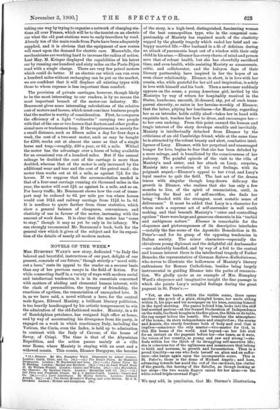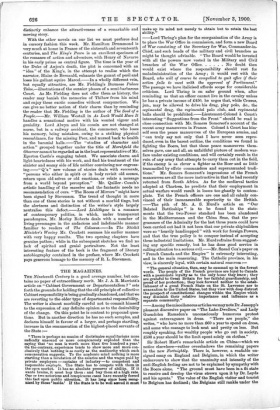NOVELS OF THE WEEK.* Man. HITMPHRY WARD'S new story, dedicated
"to Italy the beloved and beautiful, instructress of our past, delight of our present, comrade of our future," though strictly a " novel with- out a hero," rests its appeal to the reader on a securer basis than any of her previous essays in the field of fiction. For while connecting itself in a variety of ways with modern social and intellectual tendencies, it is in its essentials concerned with matters of abiding and elemental human interest, with the clash of personalities, the tyranny of friendship, the exactions of egotism, the renunciation of unrequited love. It is, as we have said, a novel without a hero, for the central male figure, Edward Manisty, a brilliant literary politician, is too heavily handicapped by his artistic temperament to win the admiration of the old-fashioned reader. Manisty, in a fit of Randolphian petulance, has resigned high office at home, and by way of accentuating his divergence from his party, is engaged on a work in which reactionary Italy, including the Vatican, the Curia, even the Index, is held up to admiration in contrast with the Italy of Cavour, of the house of Savoy, of Crispi. The time is that of the Abyssinian Expedition, and the action passes mainly at a villa near Rome, where Manisty is staying with an aunt and a widowed cousin. This cousin, Eleanor Burgoyne, the heroine
• (1.) Eleanor. By Mrs. Humphry Ward. Illustrated by Albert Sterner. London : Smith, Elder, and Co. [es.]—(2.) The King's Pawn. By Hamilton Drummond. London : W. Blackwood and Sons. 16s.]—(3.) Palate Tales. By H. Fielding. London : Harper and Brothers. [6s.]—(4.) As Luck Would Have IL By William WestalL London : Chatto and Windus. [68.]—(5.) Marshfield, the Observer. By Egerton Castle. London : Macmillan and Co. (6s.)—(6.) Old Area and Profitable Ghosts. By A. T. Qutiler-Conch. London : Cassell and Co. (es.)--(7.) Lord Linlithgow. By Morley Roberts. London : Edward Arnold. [66.)—(8.) The Stielat Minister's Wooing, and (Wier Stories. By S. R. Crockett. London: Hodder and Stoughton. NJ of the story, is a high-bred, distinguished, fascinating woman of the best cosmopolitan type, who in the congenial com- panionship of Manisty has regained much of the elasticity sapped by the ghastly tragedy which ended her brief and un- happy married life.—Her husband in a fit of delirium during an attack of pneumonia leapt out of a window with their only child in his arms.—Eleanor has every charm of mind and person
save that of robust health, but she has cheerfully sacrificed time, and even health, while assisting Manisty as amanuensis, critic, and collaborator, and the halcyon days of their literary partnership have inspired in her the hopes of an even closer relationship. Eleanor, in short, is in love with her cousin, who, while grateful for her aid and inspiration, is solely in love with himself and his book. Then a newcomer suddenly appears on the scene, a young American girl, invited by the Manistys by way of return for hospitality received in the States, handsome, uncouth, ill-dressed, shy, yet of such trans- parent sincerity, so naive in her heroine-worship of Eleanor, that the latter, pitying her loneliness—for Manisty, regarding her as an intruder, holds coldly aloof—takes her in hand with exquisite tact, teaches her how to dress, and encourages her— to her own undoing. From this point onward the human and tragic interest of the story develops steadily and inevitably, Manisty is intellectually detached from Eleanor by the criticisms of an old Cambridge friend, while at the same time he is attracted by the robust beauty and alert, combative intel- ligence of Lucy. Eleanor, with her perpetual and unassuaged hunger for love, begins to fear that she has been deluded by a mere mirage, and is humiliated by the consciousness of her
jealousy. The painful episode of the visit to the villa of Manisty's mad sister, and her attack on Lucy, surprises
Manisty into a revelation of his real feelings, with its poignant sequel,—Eleanor's appeal to her rival, and Lucy's loyal resolve to quit the field. The last act of the drama traces with singular though long-drawn delicacy the growth in Eleanor, who realises that she has only a few months to live, of the spirit of renunciation, until, in achieving the final act of self-sacrifice, she finds her being "flooded with the strangest, most ecstatic sense of deliverance." It must be added that Lucy is a character for whom such a supreme act of self-surrender is well worth making, and that beneath Manisty's "outer and controlling egotism" there were large and generous elements in his "turbid
and ambiguous nature." Eleanor is remarkable for the eloquence and picturesqueness of its descriptive interludes
—notably the fine scene of the Apostolic Benediction in St Peter's—and for its grasp of the opposing tendencies in Italian society. The minor characters—especially the chivalrous young diplomat and the delightful old Ambassador —are admirably handled, and by way of a foil to the central and human interest there is the intellectual tragedy of Father
Benecke, the representative of German Beform-Katholissismus, who tierves to illustrate the hollowness of Manisty's literary enthusiasm for Roman Catholicism, besides being largely instrumental in guiding Eleanor into the paths of renuncia-
tion. We gladly quote as an example of Mrs. Humphry Ward's eloquence and imaginative insight the fine passage in which she paints Lucy's mingled feelings during the great pageant in St Peter's :—
" Yet, as she looks, within the visible scene, there opens another : the porch of a plain, shingled house, her uncle sitting within it, his pipe and his newspaper on his knee, sunning himself in the April morning. She passes behind him, looks into the stiff leaf-scented parlour—at the framed Declaration of Independence on the walls, the fresh boughs in the fire-place, the Bible on its table, the rag.carpet before the hearth. She breathes the atmosphere of the house; its stern independence and simplicities ; the scorns and denials, the sturdy freedoms both of body and soul that it implies—conscience the only master—vice-master for God, in this His house of the world. And beyond—as her lids sink for an instant on the pageant before her—she hears, as it were, the voices of her country, so young and raw and strong !—she feels within her the throb of its struggling self-assertive life; she is conscious too of the uglinesses and meannesses that belong to birth and newness, to growth and fermentation. Then in a proud timidity—as one who feels herself an alien and on suffer- ance—she hangs again upon the incomparable scene. This is St. Peter's; there is the dome of Michael Angelo ; and here, advancing towards her amid the red of the cardinals, the clatter of the guards, the tossing of the flabellte, as though looking at her alone—the two waxen fingers raised for her alone—is the white-robed triple-crowned Pope."
We may add, in conclusion, that Mr. Sterner's illustrations
distinctly enhance the attractiveness of a remarkable and moving story.
With the other novels on our list we must perforce deal in cursory fashion this week. Mr. Hamilton Drummond is very much at home in France of the sixteenth and seventeenth centuries, and The King's Pawn. is an excellent specimen of the romance of action and adventure, with Henry of Navarre in his early prime as central figure. The time is the year of the Duke of Anjou's death, the plot is concerned with an " idea " of the King's, in the attempt to realise which the narrator, Blaise de Bernauld, exhausts the gamut of peril and loses his gallant squire Marcel.—In a wholly different vein, but equally attractive, are Mr. Fielding's Burmese Palace Tales,—illustrations of the sunnier phases of a semi-barbarous Court. As Mr. Fielding does not offer them as history, the reader may banish the memories of Thibaw from his mind and enjoy these exotic comedies without compunction. We can give no better notion of their charm than by reminding the reader that Mr. Fielding is the author of The Soul of a People.—Mr. William Westall in As Luck Would Have It handles a sensational motive with his wonted vigour and geniality. Lord Alwyn and his cousin are not changed at nurse, but in a railway accident, the commoner, who loses his memory, being mistaken, owing to a striking physical resemblance, for the missing Peer, and nursed back to health in the baronial halls.—The "studies of character and action" grouped together under the title of Marshfield the Observer cannot be regarded as in the least representative of Mr. Egerton Castle's engaging talent. We associate charm and light-heartedness with his work, and find his treatment of the sinister and seamy side of life neither convincing nor engross- ing.---" Q 's " new volume of stories deals with revenants, "persons who either in spirit or in body revisit old scenes, return upon old selves or old emotions, or relate a message from a world beyond perception." Mr. Quiller - Couch's artistic handling of the macabre and the fantastic needs no recommendation of ours. "The Room of Mirrors" might have been signed by Stevenson. The trend of thought in more than one of these stories is not without a morbid tinge, but the alertness and distinction of the writer's style largely neutralise this defect.—Lord Linlithgow is a romance of contemporary politics, in which, under transparent pseudonyms, Mr. Morley Roberts deals with a number of living personages in the audacious and indefensible manner familiar to readers of The Colossus.—In The Stickit Minister's Wooing Mr. Crockett resumes his earlier manner with very happy results. The two opening chapters have genuine pathos ; while in the subsequent sketches we find no lack of spirited and genial portraiture. Not the least interesting feature of the book is the fragment of literary autobiography contained in the preface, where Mr. Crockett pays generous homage to the memory of R. L. Stevenson.























































 Previous page
Previous page